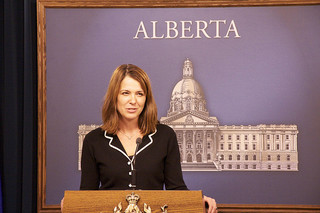Thunder Bay MP Bruce Hyer resigned from the NDP caucus this week for an interesting mix of reasons. He was disappointed he didn’t get appointed to the NDP shadow cabinet. He is concerned the party will reintroduce a long-gun registry. And he rejects, in principle, the idea that the political party whose colours he carried in the last election can tell him what to think, what to say, or how to vote.
Now let’s look at the Alberta election — a true “Dewey beats Truman” fiasco for Canada’s political commentariat, which predicted victory for Wildrose on the basis of the latest crop of junk polls, and then got to cover an impressive (as measured by seats) landslide for the Alberta Progressive Conservatives.
Why did Wildrose lose so convincingly?
An anonymous member of the Wildrose campaign team offered the view, widely quoted, that several “bozo moments” did them in. “Bozo moment” being the kind of disrespectful and divisive shorthand an angry political strategist might use to describe a duly nominated candidate for office who has chosen to think what they want, say what they want, and (presumably) later vote as they want. In the case of Wildrose, that meant a candidate wishing to promote the idea that gay people will burn in lakes of fire, and another who advocated the idea that it is a political advantage to be a Caucasian — statements that, Wildrose Leader Danielle Smith seemed to suggest, sunk her campaign in its last days and thus prevented her team from getting to implement any of their proposals.
And so, in one week, we see played out a — perhaps the — fundamental tension of the Westminster parliamentary system.
Our political system tends towards hyper-centralization, and imposes a discipline on elected representatives that, at least some of them sometimes believe, disrespects and disempowers them. A “crisis of surplus consciousness” can result, in which the few at the top end up with too much to do (and therefore cannot do it well), which the vast majority of other team members end up with too little to do (and aren’t happy about it). This, to be precise, used to be said with reference to the hyper-centralized system in place in the Soviet Union. It could also be said of a number of poorly led, hyper-centralized private corporations. It may be what parliamentary systems inherently drift into.
But as the Alberta election testifies, our political system also brutally punishes political teams who fail to maintain the tightest possible order in their ranks — at least as far as anyone can see — at every stage of proceedings including elections. “Bozo moments,” policy disagreements, strategy debated in public: Any chink of light is seized on as evidence of unfitness for office.
Team Harper learned this the hard way during the 2004 election and imposed a seamless discipline on their team, which has been widely condemned as another step toward the gutting of our democracy. They were also rewarded with victory in the following election.
Team Wildrose experimented with a little open democracy — and were politically eviscerated, blowing a remarkable opportunity to win office only a few years after their foundation.
It is, I believe, possible to have a respectful, deliberative, democratic political team that then presents a united front — the compromise that seems to work in both opposition and government. It is a balance, Danielle Smith learned this week, that seems to make or break political teams.
This article was first published in the Globe and Mail.




